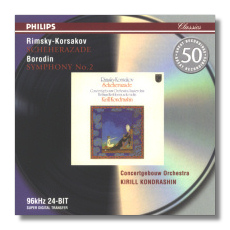
The Internet's Premier Classical Music Source
Related Links
- Latest Reviews
- More Reviews
-
By Composer
-
Collections
DVD & Blu-ray
Books
Concert Reviews
Articles/Interviews
Software
Audio
Search Amazon
Recommended Links
Site News
 CD Review
CD Review
Philips 50

- Nicolai Rimsky-Korsakoff: Schéhérazade
- Alexander Borodin: Symphony #2
Concertgebouw Orchestra, Amsterdam/Kirill Kondrashin
Philips Classics 464735-2 ADD 72:10
Kondrashin had a distinguished career in the former Soviet Union that started when he was barely in his twenties. He held conducting posts at Leningrad's (St. Petersburg's) Maly and at Moscow's Bolshoi Theaters, and in 1960, he took the leadership of the Moscow Philharmonic. Most Westerners became aware of him in 1958, when he conducted at the Tchaikovsky Piano Competition for winning American pianist Van Cliburn. He made a few recordings for RCA Victor, with and without Cliburn, around that time. However, he largely remained behind the Iron Curtain until 1978, when he defected to the West. He was quickly offered a post with Amsterdam's Concertgebouw Orchestra. Tragically, he died less than two years later at the young age (at least for conductors!) of 67.
In his short time in Amsterdam, Kondrashin made several excellent recordings for Philips Classics. Many of these now are unavailable. Fortunately, Philips has seen fit to reissue what amounts to a record and a half of Kondrashin's work in their "Philips 50" series – "a wonderful harvest from 50 years of recording," according to the label's publicity.
The Rimsky-Korsakov is a studio recording from 1979; the Borodin was recorded a year later in concert. Both are winning versions of quintessentially Russian works. Kondrashin conducts a thinking-man's Schéhérazade, eschewing spectacle for subtlety and characterization. The wind chords that follow the imperious opening fanfare (the one that represents the murderous Sultan) are characteristic of what is to follow: they are played thoughtfully, and with a concern for atmosphere and story-telling. Nothing is thrown away in this performance. Beecham might be more charming, Karajan more sensuous, and Stokowski more flashy, but Kondrashin holds his own in this exalted company with a very intelligent interpretation, one that couldn't be farther removed from routine. Violinist Hermann Krebbers is meltingly beautiful in the "title role" – all femininity and gentleness.
The Borodin symphony badly needs a recording that combines podium savvy with modern recording techniques. Svetlanov's version, a favorite of mine, is elusive and poorly recorded by Soviet engineers. Kondrashin comes close to delivering the goods. The audience's enthusiasm at the end is well merited: this is a charismatic and colorful reading of this masterful score. I could easily live with it to the exclusion of any other.
The analog recording in both works is particularly attractive, now that it has been digitally remastered.
Copyright © 2001, Raymond Tuttle


















